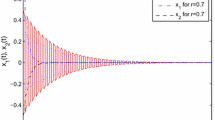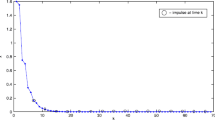Abstract
This paper is concerned with the stability of discrete-time impulsive systems with time delays. Some new stability criteria are provided by employing Lyapunov functions together with Razumikhin technique. Sufficient conditions are established to guarantee that even if impulsive perturbations occur frequently in some time domains, stability of discrete-time impulsive delay systems can still be achieved if the impulsive intervals with low impulse frequency satisfy certain conditions, which makes the obtained criteria more practical in this paper. Moreover, application to a class of discrete-time impulsive neural networks is also considered. Finally, two numerical examples and a practical example are given to illustrate the effectiveness and superiority of the obtained results.









Similar content being viewed by others
References
C. Briat, A. Seuret, Convex dwell-time characterizations for uncertain linear impulsive systems. IEEE Trans. Autom. Control 57, 3241–3246 (2012)
C. Briat, Stability analysis and stabilization of stochastic linear impulsive, switched and sampled-data systems under dwell-time constraints. Automatica 74, 279–287 (2016)
J. Cao, J. Wang, Global asymptotic stability of a general class of recurrent neural networks with time varying delays. IEEE Trans. Circuits Syst. I Fundam. Theory Appl. 50, 34–44 (2003)
W.-H. Chen, W.X. Zheng, Global exponential stability of impulsive neural networks with variable delay: an LMI approach. IEEE Trans. Circuits Syst. I Regul. Pap. 56, 1248–1259 (2009)
S. Dashkovskiy, A. Mironchenko, Input-to-state stability of nonlinear impulsive systems. SIAM J. Control Optim. 51, 1962–1987 (2013)
K. Gopalsamy, Stability and Oscillations in Delay Differential Equations of Population Dynamics (Kluwer, Dordrecht, 1992)
Q.-L. Han, Absolute stability of time-delay systems with sector-bounded nonlinearity. Automatica 41, 171–2176 (2005)
Q.-L. Han, Y. Liu, F. Yang, Optimal communication network-based \(H_\infty \) quantized control with packet dropouts for a class of discrete-time neural networks with distributed time delay. IEEE Trans. Neural Netw. Learn Syst. 27, 426–434 (2016)
J.P. Hespanha, D. Liberzon, A.R. Teel, Lyapunov conditions for input-to-state stability of impulsive systems. Automatica 44, 2735–2744 (2008)
D.W.C. Ho, J. Liang, J. Lam, Global exponential stability of impulsive high-order BAM neural networks with time-varying delays. Neural Netw. 19, 1581–1590 (2006)
L. Huang, Linear Algebria in Systems and Control Theory (Science Press, Beijing, 1984)
A. Khadra, X. Liu, X. Shen, Analyzing the robustness of impulsive synchronization coupled by linear delayed impulses. IEEE Trans. Autom. Control 54, 923–928 (2009)
O.M. Kwon, M.J. Park, J.H. Park, S.M. Lee, E.J. Cha, Improved delay-dependent stability criteria for discrete-time systems with time-varying delays. Circuits Syst. Signal Process. 32, 1949–1962 (2013)
V. Lakshmikantham, D.D. Bainov, P.S. Simeonov, Theory of Impulsive Differential Equations (World Scientific, Singapore, 1989)
F. Li, C. Du, C. Yang, W. Gui, Passivity-based asynchronous sliding mode control for delayed singular Markovian jump systems. IEEE Trans. Autom. Control 63, 2715–2721 (2018)
X. Li, Global exponential stability of impulsive delay systems with flexible impulse frequency. IEEE Trans. Syst. Man Cybern. Syst. (2017). https://doi.org/10.1109/TSMC.2017.2766260
X. Li, S. Song, Stabilization of delay systems: delay-dependent impulsive control. IEEE Trans. Autom. Control 62, 406–411 (2017)
Y. Li, Impulsive synchronization of stochastic neural networks via controlling partial states. Neural Process. Lett. 46, 59–69 (2017)
Y. Li, J. Lou, Z. Wang, F.E. Alsaadi, Synchronization of dynamical networks with nonlinearly coupling function under hybrid pinning impulsive controllers. J. Frankl. Inst. 355, 6520–6530 (2018)
Y. Lin, Y. Zhang, Synchronization of stochastic impulsive discrete-time delayed networks via pinning control. Neurocomputing 286, 31–40 (2018)
B. Liu, H.J. Marquezb, Razumikhin-type stability theorems for discrete delay systems. Automatica 43, 1219–1225 (2007)
B. Liu, D.J. Hill, Uniform stability of large-scale delay discrete impulsive systems. Int. J. Control 82, 228–240 (2009)
X. Liu, Z. Zhang, Uniform asymptotic stability of impulsive discrete systems with time delay. Nonlinear Anal. 74, 4941–4950 (2011)
Y. Liu, S. Zhao, Controllability for a class of linear time-varying impulsive systems with time delay in control input. IEEE Trans. Autom. Control 56, 395–399 (2011)
Y. Liu, Z. Wang, X. Liu, Stability analysis for a class of neutral-type neural networks with Markovian jumping parameters and mode-dependent mixed delays. Neurocomputing 94, 46–53 (2012)
Y. Liu, Z. Wang, J. Liang, X. Liu, Stability and synchronization of discrete-time Markovian jumping neural networks with mixed mode-dependent time delays. IEEE Trans. Neural Netw. 20, 1102–1116 (2009)
J. Lu, D.W.C. Ho, J. Cao, A unified synchronization criterion for impulsive dynamical networks. Automatica 46, 1215–1221 (2010)
J. Lu, Z. Wang, J. Cao, D.W.C. Ho, J. Kurths, Pinning impulsive stabilization of nonlinear dynamical networks with time-varying delay. Int. J. Bifurc. Chaos 22, 1250176 (2012)
M.S. Mahmoud, F.M. Al-Sunni, Y. Shi, Switched discrete-time delay systems: delay-dependent analysis and synthesis. Circuits Syst. Signal Process. 28, 735–761 (2009)
P. Naghshtabrizi, J.P. Hespanha, A.R. Teel, Exponential stability of impulsive systems with application to uncertain sampled-data systems. Syst. Control Lett. 57, 378–385 (2008)
I.M. Stamova, G.T. Stamov, Lyapunov–Razumikhin method for impulsive functional differential equations and applications to the population dynamics. J. Comput. Appl. Math. 130, 163–171 (2001)
S. Tong, D. Qian, J. Fang, Joint estimation of parameters, states and time delay based on singular pencil model. Int. J. Innov. Comput. Inf. Control 12, 225–242 (2016)
Q. Wang, X.Z. Liu, Exponential stability for impulsive delay differential equations by Razumikhin method. J. Math. Anal. Appl. 309, 462–473 (2005)
Y. Wang, J. Lu, J. Liang, J. Cao, M. Perc, Pinning synchronization of nonlinear coupled Lur’e networks under hybrid impulses. IEEE Trans. Circuits Syst. II Exp. Briefs (2018). https://doi.org/10.1109/TCSII.2018.2844883
T. Wu, F. Li, C. Yang, W. Gui, Event-based fault detection filtering for complex networked jump systems. IEEE/ASME Trans. Mechatron. 23, 497–505 (2018)
X. Wu, Y. Zhang, Input-to-state stability of discrete-time delay systems with delayed impulses. Circuits Syst. Signal Process. 37, 2320–2356 (2018)
H. Xu, K. Teo, Stabilizability of discrete chaotic systems via unified impulsive control. Phys. Lett. A 374, 235–240 (2009)
T. Yang, Impulsive Control Theory (Springer, Berlin, 2001)
M. Zhang, P. Shi, Z. Liu, J. Cai, H. Su, Dissipativity-based asynchronous control of discrete-time Markov jump systems with mixed time delays. Int. J. Robust Nonlinear Control 28, 2161–2171 (2018)
M. Zhang, P. Shi, Z. Liu, L. Ma, H. Su, \(H_{\infty }\) filtering for discrete-time switched fuzzy systems with randomly occurring time-varying delay and packet dropouts. Signal Process. 143, 320–327 (2018)
M. Zhang, P. Shi, L. Ma, J. Cai, H. Su, Quantized feedback control of fuzzy Markov jump systems. IEEE Trans. Cybern. (2018). https://doi.org/10.1109/TCYB.2018.2842434
Y. Zhang, J. Sun, G. Feng, Impulsive control of discrete systems with time delay. IEEE Trans. Autom. Control 54, 830–834 (2009)
Y. Zhang, Exponential stability of impulsive discrete systems with time delays. Appl. Math. Lett. 25, 2290–2297 (2012)
Acknowledgements
The authors would like to thank the editor and the anonymous reviewers for their constructive comments and suggestions which improved the quality of the paper. This work is supported by the Fundamental Research Funds for the Central Universities and the program of China Scholarship Council.
Author information
Authors and Affiliations
Corresponding author
Additional information
Publisher's Note
Springer Nature remains neutral with regard to jurisdictional claims in published maps and institutional affiliations.
Rights and permissions
About this article
Cite this article
Lin, Y., Zhang, Y. New Results on Stability of Discrete-Time Impulsive Systems with Time Delays. Circuits Syst Signal Process 38, 4572–4596 (2019). https://doi.org/10.1007/s00034-019-01089-y
Received:
Revised:
Accepted:
Published:
Issue Date:
DOI: https://doi.org/10.1007/s00034-019-01089-y




